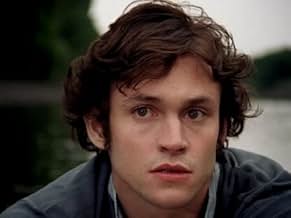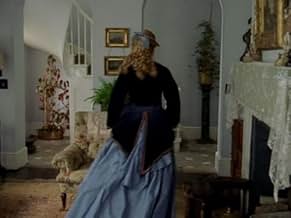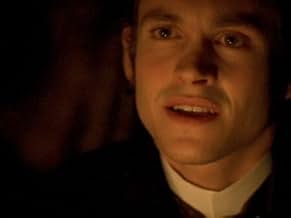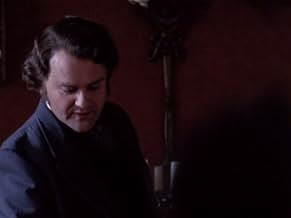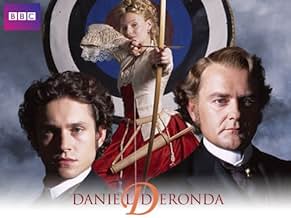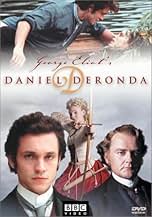Daniel Deronda
- Miniserie de TV
- 2002
- 53min
PUNTUACIÓN EN IMDb
7,2/10
5,4 mil
TU PUNTUACIÓN
Añade un argumento en tu idiomaSet in Victorian London, Gwendolen Harleth is drawn to Daniel Deronda, a selfless and intelligent gentleman of unknown parentage, but her own desperate need for financial security may destro... Leer todoSet in Victorian London, Gwendolen Harleth is drawn to Daniel Deronda, a selfless and intelligent gentleman of unknown parentage, but her own desperate need for financial security may destroy her chance at happiness.Set in Victorian London, Gwendolen Harleth is drawn to Daniel Deronda, a selfless and intelligent gentleman of unknown parentage, but her own desperate need for financial security may destroy her chance at happiness.
- Ganó 3 premios BAFTA
- 5 premios y 4 nominaciones en total
Explorar episodios
Reseñas destacadas
10hfk
The first time 'round, when PBS initially offered up "Deronda", I watched the first 15 minutes or so and was so disgusted with Gwendolynn that I changed channels and didn't think twice. Second time 'round, based on reviews here at IMDB, I gave it a bit more time and I'm certainly glad that I did. "Deronda" is a powerfull, beautiful, bit of television. I'm a conservative by nature and, on a regular basis, I'm sickened by the politically correct preaching that's often pushed by PBS and Network television. Daniel Deronda like, say "Prime Suspect", is story-telling with a liberal slant that is both legitimate and thought-provoking. I thoroughly enjoyed the story, and the lush production. I'm surprised by the nit-picking about "wooden" acting: I found the acting excellent, particularly compared to the endless trash television that's pumped into the idiot box these days. perhaps this is trite, but "Deronda" actually inspired me, uplifted me and, at least as far as I'm concerned, that's one of the most significant hallmarks of great art. Don't miss it.
7=G=
"Daniel Deronda" is a worthy knock-off of George Eliot's novel of the same name which tells of a young Englishman's search for meaning and purpose while enjoying a life of property and leisure. As with most Victorian period costume dramas out of the UK, this film is sumptuously appointed and well represented by the players and places as it meanders through the usual multiplicity of relationships from aristocrat to pauper with a Jewish thread for distinction. "Daniel Deronda" conjures a range of characters from a stoic martinet to a spoiled beauty to an attractive Jewess and beyond with love, greed, envy, guile, and death all swirling around the Deronda character as it manages to sort itself out with a coherent story arc and a more or less happy ending. A "should see" for anyone into Victorian flicks. (B)
If you're familiar with George Eliot and have read her books, you'll most likely enjoy this adaptation.
But if you're a George Eliot purist, you may be dismayed by the film's romanticization of Daniel & Gwendolyn's relationship. I personally was okay with it and found it a forgivable artistic liberty, as it was handled delicately and tastefully and did not detract from the heart of the story. In fact, I liked the adapted screenplay for its restraint.
If you're a Jane Austen fan but not familiar with Eliot's work, you might find this story lacking in wit compared to Austen's stories, or just too glum. But George Eliot herself was a very different woman from Austen. The Jewish subplot--something that is also present in Eliot's more famous 'Middlemarch'--is enough to make the two authors different, but the sociopolitical depth and soberness of Eliot's work also sets them apart.
The casting was terrific all around (including the magnificently aging Greta Scacchi), and the costumes & scenery were perfect.
~NN
But if you're a George Eliot purist, you may be dismayed by the film's romanticization of Daniel & Gwendolyn's relationship. I personally was okay with it and found it a forgivable artistic liberty, as it was handled delicately and tastefully and did not detract from the heart of the story. In fact, I liked the adapted screenplay for its restraint.
If you're a Jane Austen fan but not familiar with Eliot's work, you might find this story lacking in wit compared to Austen's stories, or just too glum. But George Eliot herself was a very different woman from Austen. The Jewish subplot--something that is also present in Eliot's more famous 'Middlemarch'--is enough to make the two authors different, but the sociopolitical depth and soberness of Eliot's work also sets them apart.
The casting was terrific all around (including the magnificently aging Greta Scacchi), and the costumes & scenery were perfect.
~NN
The usual lush mini-series adapation from that reliable team, Andrew Davies and the BBC, of a literary property, this time George Eliot's almost forgotten last novel.
Daniel (Hugh Dancy) is the gorgeous if slightly wet boy of mysterious parentage adopted by wealthy amiable old buffer Sir Hugo (Edward Fox). He falls in love with the wrong woman, the beautiful but self-absorbed Gwendolen (Romola Garai). She however is propelled into marriage with ace bounder (and Sir Hugo's heir) Henleigh Grandcourt (Hugh Bonneville). Daniel then becomes interested in Mirah (Johdi May), a promising singer of Jewish background, and through her ailing brother Mordecai (Daniel Evans) the Zionist cause (yes, hotting up as far back as the 1870s). Grandcourt meets a bounder's fate and Gwendolen is now free to marry Daniel, but guess what ?
The costumes are great, the acting impeccable, the photography luminous but the story lacks punch. It is didactic rather than romantic, with metaphorical posters all over the place for women's rights and a homeland for the Jewish people. Hugh Dancy looks right for the part but Daniel is too much of a prig to be very likeable (though he has my sympathy when he discovers that Barbara Hershey, resplendent in a Venetian Palazzo is his mother Greta Scacchi would not have been so bad).
The most engaging characters are Grandcourt the bounder and his sidekick Lush (David Bamber Mr Collins in `Pride and Prejudice') and yet we are meant to despise them both. Gwendolen is sympathetic to the extent she marries Grandcourt to provide financial security for her mother and sisters, but she is a real dork otherwise. Generally the characters lack the panache of say, Trollope's characters in `The Way We Live Now', or Eliot's own in `Middlemarch'. Perhaps Ms Eliot should have quit while she was ahead.
The critics at the time (including Henry James) were baffled by the `Jewish' aspect of the story. It certainly was an outsider's view, yet it rings true today; here Ms Eliot was being prophetic, or was at least aware of the combination of repression, deprivation and myth that could give rise to a successful social movement. In 1876, the year the novel was published, it seemed most unlikely that Palestine would ever become a significant Jewish settlement. Daniel, desperate to find out about his background, finds a cause bigger than himself and eagerly throws himself into it. One has the feeling that Mirah, musically talented though she is, is going to be playing second fiddle.
Anyway, I enjoyed Hugh Bonneville's Grandcourt, a terrific bounder, and David Bamber's Lush (Mr Collins turns bad). And of course, this is Sunday evening stuff, so one mustn't be too picky about the crummy plot and the unsympathetic principals. I usually find myself at this point thinking `I must read the book' (if I haven't already), but this time I don't think I'll bother.
Daniel (Hugh Dancy) is the gorgeous if slightly wet boy of mysterious parentage adopted by wealthy amiable old buffer Sir Hugo (Edward Fox). He falls in love with the wrong woman, the beautiful but self-absorbed Gwendolen (Romola Garai). She however is propelled into marriage with ace bounder (and Sir Hugo's heir) Henleigh Grandcourt (Hugh Bonneville). Daniel then becomes interested in Mirah (Johdi May), a promising singer of Jewish background, and through her ailing brother Mordecai (Daniel Evans) the Zionist cause (yes, hotting up as far back as the 1870s). Grandcourt meets a bounder's fate and Gwendolen is now free to marry Daniel, but guess what ?
The costumes are great, the acting impeccable, the photography luminous but the story lacks punch. It is didactic rather than romantic, with metaphorical posters all over the place for women's rights and a homeland for the Jewish people. Hugh Dancy looks right for the part but Daniel is too much of a prig to be very likeable (though he has my sympathy when he discovers that Barbara Hershey, resplendent in a Venetian Palazzo is his mother Greta Scacchi would not have been so bad).
The most engaging characters are Grandcourt the bounder and his sidekick Lush (David Bamber Mr Collins in `Pride and Prejudice') and yet we are meant to despise them both. Gwendolen is sympathetic to the extent she marries Grandcourt to provide financial security for her mother and sisters, but she is a real dork otherwise. Generally the characters lack the panache of say, Trollope's characters in `The Way We Live Now', or Eliot's own in `Middlemarch'. Perhaps Ms Eliot should have quit while she was ahead.
The critics at the time (including Henry James) were baffled by the `Jewish' aspect of the story. It certainly was an outsider's view, yet it rings true today; here Ms Eliot was being prophetic, or was at least aware of the combination of repression, deprivation and myth that could give rise to a successful social movement. In 1876, the year the novel was published, it seemed most unlikely that Palestine would ever become a significant Jewish settlement. Daniel, desperate to find out about his background, finds a cause bigger than himself and eagerly throws himself into it. One has the feeling that Mirah, musically talented though she is, is going to be playing second fiddle.
Anyway, I enjoyed Hugh Bonneville's Grandcourt, a terrific bounder, and David Bamber's Lush (Mr Collins turns bad). And of course, this is Sunday evening stuff, so one mustn't be too picky about the crummy plot and the unsympathetic principals. I usually find myself at this point thinking `I must read the book' (if I haven't already), but this time I don't think I'll bother.
This was one of the more exquisite costume drama adaptations I have seen, with attention to detail absolutely striking in an archery scene that sets the bar for the entire series. Like the novel, it is polarizing in its two stories in one - people seem to either love/hate Daniel's plight or love/hate Gwendolyn's.
Personally, I found Gwendolyn equally annoying in both novel and film. Hugh Darcy, as the eponymous hero, was pretty to look at and delivers a fine, if unremarkable, performance.
But it is Hugh Bonneville as the dastardly Henleigh Grandcourt who took my breath away! He is flawlessly reprehensible, stealing every scene he was in and when he wasn't in a scene, I couldn't wait to see him again! It was terrific seeing Hugh Bonneville in such a role, as he's usually cast in the "very nice guy" roles (Bridget Jones Diary, Iris, Tipping the Velvet, etc). Although he's fine in such roles, as Grandcourt he made my skin crawl with his morally bankrupt, wealthy and pugnacious swagger. LOVED him!
What this series could have used more of was Jodhi May and Greta Scacchi. In difficult supporting roles, both women shine as, respectively, a searching, haunted Jewess and a scorned, bitter mistress. Barbara Hershey makes an appearance late in the series in a pivotal plot device that I won't reveal lest some unsuspecting viewer be bitter with me, and in a limited role gives a performance that reminds us why she became famous in the first place (and at least for this viewer, made me forgive her 'Beaches').
Overall, this adaptation is very enjoyable and recommended viewing for fans of the genre.
Personally, I found Gwendolyn equally annoying in both novel and film. Hugh Darcy, as the eponymous hero, was pretty to look at and delivers a fine, if unremarkable, performance.
But it is Hugh Bonneville as the dastardly Henleigh Grandcourt who took my breath away! He is flawlessly reprehensible, stealing every scene he was in and when he wasn't in a scene, I couldn't wait to see him again! It was terrific seeing Hugh Bonneville in such a role, as he's usually cast in the "very nice guy" roles (Bridget Jones Diary, Iris, Tipping the Velvet, etc). Although he's fine in such roles, as Grandcourt he made my skin crawl with his morally bankrupt, wealthy and pugnacious swagger. LOVED him!
What this series could have used more of was Jodhi May and Greta Scacchi. In difficult supporting roles, both women shine as, respectively, a searching, haunted Jewess and a scorned, bitter mistress. Barbara Hershey makes an appearance late in the series in a pivotal plot device that I won't reveal lest some unsuspecting viewer be bitter with me, and in a limited role gives a performance that reminds us why she became famous in the first place (and at least for this viewer, made me forgive her 'Beaches').
Overall, this adaptation is very enjoyable and recommended viewing for fans of the genre.
¿Sabías que...?
- CuriosidadesThe novel is set in the early 1860s, whereas the adaptation moves the action ahead to 1874, the year that George Eliot began writing the novel.
- PifiasAt Ezra Cohen's store, the baby's left shoe and sock disappear then reappear.
- ConexionesFeatured in George Eliot: A Scandalous Life (2002)
Selecciones populares
Inicia sesión para calificar y añadir a tu lista para recibir recomendaciones personalizadas
- How many seasons does Daniel Deronda have?Con tecnología de Alexa
Detalles
- Fecha de lanzamiento
- Países de origen
- Sitios oficiales
- Idioma
- Títulos en diferentes países
- 丹尼爾的半生緣
- Localizaciones del rodaje
- Edimburgo, Escocia, Reino Unido(Jewish market scenes)
- Empresas productoras
- Ver más compañías en los créditos en IMDbPro
Contribuir a esta página
Sugerir un cambio o añadir el contenido que falta

Principal laguna de datos
By what name was Daniel Deronda (2002) officially released in India in English?
Responde
